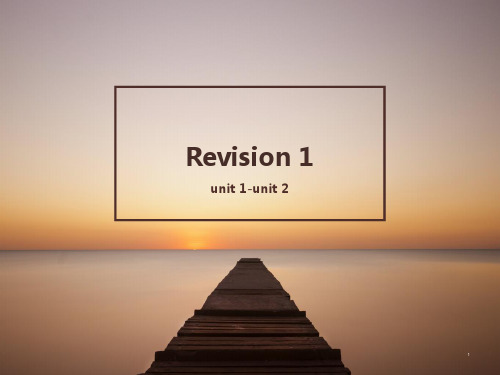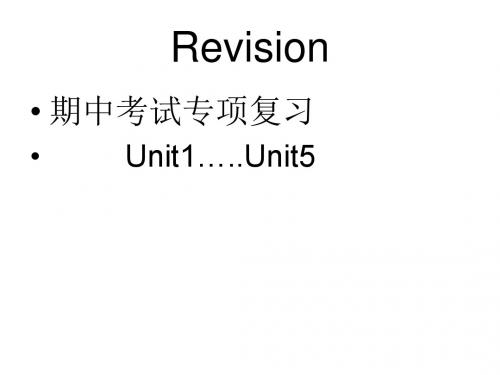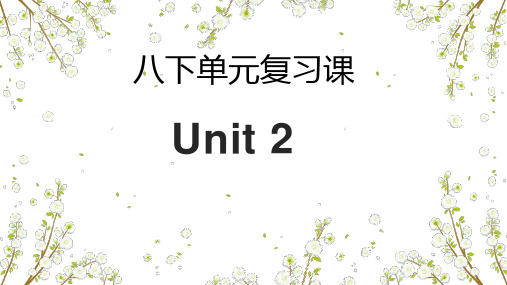八年级英语下册期中复习PPT课件
合集下载
八下英语期中复习ppt课件

12
5. (2013·邵阳中考)—Mr. Li is badly ill in hospital.
—___________
A. It doesn’t matter.
B. Really?
C. I’m sorry to hear that.
【解析】选C。考查情景交际。对别人生病或遇到不幸表示难
过用I’m sorry to hear that. 。故选C。
含情态动词should的句式结构 肯定句 1. should +动词原形
否定句 2. shouldn’t +动词原形
一般疑问句 3. should +主语+动词原形
用should或shouldn’t填空。 1. Gina is ill. She _s_h_o__u_ld____ see a doctor and get some medicine. 2. He has a sore throat. He_s_h_o_u_l_d_n_’_t eat too much hot food. 3. You __s_h_o__u_ld_n_’__t_ play soccer in the street. It’s dangerous. 4. We __s_h__o_u_ld_____ say thanks to others when they help us.
see sb. doing sth. to one’s surprise get off the bus get on the bus thanks to think about agree to do sth. get into trouble
3
摔倒faΒιβλιοθήκη l down对感兴趣be interested in
5. (2013·邵阳中考)—Mr. Li is badly ill in hospital.
—___________
A. It doesn’t matter.
B. Really?
C. I’m sorry to hear that.
【解析】选C。考查情景交际。对别人生病或遇到不幸表示难
过用I’m sorry to hear that. 。故选C。
含情态动词should的句式结构 肯定句 1. should +动词原形
否定句 2. shouldn’t +动词原形
一般疑问句 3. should +主语+动词原形
用should或shouldn’t填空。 1. Gina is ill. She _s_h_o__u_ld____ see a doctor and get some medicine. 2. He has a sore throat. He_s_h_o_u_l_d_n_’_t eat too much hot food. 3. You __s_h_o__u_ld_n_’__t_ play soccer in the street. It’s dangerous. 4. We __s_h__o_u_ld_____ say thanks to others when they help us.
see sb. doing sth. to one’s surprise get off the bus get on the bus thanks to think about agree to do sth. get into trouble
3
摔倒faΒιβλιοθήκη l down对感兴趣be interested in
Unit1-5期中复习 人教版英语八年级下册复习课件 (共61张PPT)

2. alone vs lonely alone(一个人的事实live alone), lonely(感觉孤独寂寞lonely man)
The man live _a_l_o_n_e__ in the country, but he never feel _l_o_n_e_l_y.
复习热身赛—动词搭配
cut up clean up up give up use up put up take up turn up fix up go up stay up
down
cut down put down turn down take down die down pull down
set out take out out give out put out run out work out help out
A. take out
B. take off
C. take up
D. take down
ห้องสมุดไป่ตู้
14 —Did you find your watch?
—No, I ______ my drawers, but I could not find it.
A. looked through B. looked into C. looked after D. looked over
set off take off off give off put off go off
介词短语
1. --What can I do to find my lost watch? -- You can ______ a notice.
A. put off
B. put up
C. put on
D. put in
冀教版八年级英语下册 期中复习课件(共23张PPT)

large / western / pleasant / basic / dry / shy dangerous / brave / modern / simple
4. It’s __n_e__a__r_ly__(几乎) noon. The bear is still sleeping. 5. Let’s play on the swing _i_n_s__t_e_a__d_(代替) of lying on
16. Sometimes I don’t call my friends. I _A__ them on the
computer _____ .
A. chat with; instead B. chat about; instead
C. chat with; instead of D. chat about; instead of
this afternoon.
13. He __h_i_d___(hid) the money under the floor two years
ago.
14. At theb__e_g__in__n_i(nbgegin) of the _t_w__e_n__t_i_e_t_h_(twenty)
century, the number of tigers in the wild was around
the grass, shall we?
6. If he doesn’t go there , _n_e__i_t_h_e__r (也不) will I.
gently / truly / terribly / simply / bravely
7. I won’t go to bed _u_n__t_i_l (直到) I finish my homework. 8. Neither people nor animals can liwvei_t_h_o_ u(没t 有) water. 9. Everyone is heree__x_c__e_p__t(除了) Jim because he was
4. It’s __n_e__a__r_ly__(几乎) noon. The bear is still sleeping. 5. Let’s play on the swing _i_n_s__t_e_a__d_(代替) of lying on
16. Sometimes I don’t call my friends. I _A__ them on the
computer _____ .
A. chat with; instead B. chat about; instead
C. chat with; instead of D. chat about; instead of
this afternoon.
13. He __h_i_d___(hid) the money under the floor two years
ago.
14. At theb__e_g__in__n_i(nbgegin) of the _t_w__e_n__t_i_e_t_h_(twenty)
century, the number of tigers in the wild was around
the grass, shall we?
6. If he doesn’t go there , _n_e__i_t_h_e__r (也不) will I.
gently / truly / terribly / simply / bravely
7. I won’t go to bed _u_n__t_i_l (直到) I finish my homework. 8. Neither people nor animals can liwvei_t_h_o_ u(没t 有) water. 9. Everyone is heree__x_c__e_p__t(除了) Jim because he was
人教版英语go-for-it八年级下学期英语期中考试复习课件

1. My alarm didn’t go off so I woke up late. alarm n. 闹钟 e.g. What time shall I set the alarm for? 我该把闹钟拨到几点钟响?
2. I was waiting for the bus when it began to rain heavily. 1) begin v. (began) 开始 e.g. I’ll begin whenever you’re ready. 你什么时候准备好我就开始。
2) heavily adv. 在很大程度上;大量地
e.g. moving heavily 吃力地移动
It was raining heavily. 雨下得很大。
3. So, when the rainstorm suddenly came, …
suddenly adv. 突然;忽然 e.g. I suddenly remembered that I hadn’t locked the door. 我忽然想起没有锁门。
我应该量一下体温吗? Should I take my temperature?
主语+ should/shouldn’t + 动词原形. .. ①你应该躺下休息一会儿。 You should lie down and rest.
②你晚上不应该出去。 You shouldn’ t go out at night.
---他应该去看牙医并且拍一个X片子。
---Does he have a toothache? ---Yes, he does. --- He should see a dentist and get an X-ray.
翻译下列句子
Unit2期中复习课件人教版八年级英语下册

八下单元复习课
Unit 2
What volunteer jobs can we do?
• for the environment • for the sick people • for the old peope • for the poor kids
• help clean up the city parks/streets • plant more trees • ask people to protect the environment
句型积累
5. 从他们的眼睛里你可以看到他们正在进行每本不同的新书之旅。
You can see in their eyes that they're going on a different journey with each new book.
6. 我想把我在动物医院工作的计划推迟到明年夏天。
I want to put off my plannext summer.
单元语法点回顾
短语动词
1.定义:短语动词是由动词加介词、副词或其他词构成的固 定词组或习语(idioms),其作用和动词差不多。有些短语 动词相当于及物动词,有些则相当于不及物动词。2.类型及 用法:(1)动词+介词(+sb./sth.),相当于一个及物动词, 它的宾语总是在介词之后。如:look after, look at, listen to, take after等。 e.g.She takes after her father.
21._d_i_s_a_b__le_d__adj. 有残疾的,丧失能力的 28.__c_a_r_r_y_____v. 携带,搬运
Words
29._t_r_a_i_n______v. 训练,培养
Unit 2
What volunteer jobs can we do?
• for the environment • for the sick people • for the old peope • for the poor kids
• help clean up the city parks/streets • plant more trees • ask people to protect the environment
句型积累
5. 从他们的眼睛里你可以看到他们正在进行每本不同的新书之旅。
You can see in their eyes that they're going on a different journey with each new book.
6. 我想把我在动物医院工作的计划推迟到明年夏天。
I want to put off my plannext summer.
单元语法点回顾
短语动词
1.定义:短语动词是由动词加介词、副词或其他词构成的固 定词组或习语(idioms),其作用和动词差不多。有些短语 动词相当于及物动词,有些则相当于不及物动词。2.类型及 用法:(1)动词+介词(+sb./sth.),相当于一个及物动词, 它的宾语总是在介词之后。如:look after, look at, listen to, take after等。 e.g.She takes after her father.
21._d_i_s_a_b__le_d__adj. 有残疾的,丧失能力的 28.__c_a_r_r_y_____v. 携带,搬运
Words
29._t_r_a_i_n______v. 训练,培养
八年级英语下学期期中复习 unit 19(PPT)4-1

他起床太晚没赶上公交车.
He got up too late to catch the bus. He didn’t get up early enough to catch the bus.
He got up so late that he didn’t catch the bus. missed the bus.
4 Will you pleaseb_r_i_n_g me a new pencil ? 5 Shall we b_r_i_n_gsome food for a picnic ?
杂多糖。化学分析纯化后的黑木耳多糖,甘露糖、葡萄糖、木糖和己糖醛酸是其主要成分,其摩尔比为.:.:.:.。无脊椎动物组织中的氨基葡聚糖类似物、海洋 藻类中的岩藻糖硫酸化多糖以及肝素等均具有抗凝血或抗血小板聚集活性,但黑木耳中抗凝血活性的多糖与它们有着结构性的不同。 [] 腺苷类物质 黑木耳 中含有一种水溶性成分,可以; 学习心得 / 学习心得 ;抑制血小板聚集,后经多次试验证实为腺苷类物质。 [] 木耳黑色素 从黑木耳 中分离到的黑色素是一种呈色的多糖肽,由葡萄糖、甘露糖、半乳糖、岩藻糖和一短肽链组成,这些成分解离为单糖体时不呈色,能溶于水,具有增强机体 免疫功能的生理活性。从木耳子实体中分离的黑刺菌素有抗真菌作用。 [] 其他成分 黑木耳中含有麦角甾醇、二氢麦角甾醇、卵磷脂、脑磷脂和鞘磷脂,还 含有维生素A、维生素D及维生素K等。 [] 主要价值 自古以来黑木耳就是我国著名的食用菌和药用菌,食用之上品,被誉为弥足珍贵的食用菌之王。黑木耳有 降血脂、抗血栓、抗衰老、抗肿瘤等功能,无论是直接食用还是作为食品配方用料,都是一种较为理想的保健食品资源。 [] 药用功能 中医认为,黑木耳性 味甘平,具有清肺润肠、滋阴补血、活血化瘀 黑木耳 黑木耳 、明目养胃等功效。能用于治疗崩漏、痔疮、血痢、贫血及便秘等症状。同时它所含有的发酵
最新新外研版八年级下册期中总复习PPT课件

点题分析:
开头:
那个有小巷有一盏灯,是属于一位残疾的老妇
人。和很多风烛残年的老人一样,她也有古怪的脾
气。白天,她就坐在门口的木椅上,听着收音机里
“嘶嘶啦啦——”的音乐声。晚上,她就点着灯,
一坐坐到半夜,间或有小孩打闹着经过,老妇人囊,行走在
其基本结构为: as +形容词或副词的原级+ as。 否定结构为: not as/so. . . as“不如某物/某人”。 8.数词的用法 9. enough作副词,修饰形容词或副词时放在被修 饰词后面;
enough作形容词,修饰名词时常放在被修饰词之 前。
10.当主语是第一人称(I, we),think表示“看 法”,其后接宾语从名时,若宾语从名要表示否 定意义,在形式上应该否定前面的主名。 注意反义疑问句 11. alone既可用作形容词,又可用作副词,意为 “独自的(地)、单独的(地)”,侧重于说明 独自一人,没有同伴或助手,指的是客观情 况。 lonely只用作形容词,它在句中既可作定语,也 可作表语,表示“孤独的,寂寞的”意思。该词 带有浓厚的感情色彩,具有“渴望得到同伴”的 含义
16.So far 17.Count down 18.Look forward to doing sth 19.The same as Be different from
M3
1.三个到达的用法 2.Alresdy和yet的区分
3.
4.in order to意为“为了……”, 表示目的, 其后 接动词原形, 否定结构为in order not to。 in order to在句中表示目的时, 常可以转化成in order that或so that引导的目的状语从句。 5. none意为“没有一个”, 是不定代词, 可以 与of连用表示范围构成none of; 作主语时, 谓 语动词要用单数形式。
新外研版八年级下册期中总复习课件

描述已经完成的动作或状态,强 调对现在的影响。
动词时态与语态
01
02
03
04
一般过去时
描述过去发生的动作或状态。
过去进行时
描述过去正在进行的动作或存 在的状态。
过去完成时
描述过去已经完成的动作或状 态,强调对过去的影响。
现在完成进行时
描述从过去开始,持续到现在 ,并可能继续下去的动作或状
态。
名词性从句
详细描述
1. 学习说明文的写作 原则和语言特点,包 括准确性、客观性、 条理性等。
2. 掌握说明文的表达 方式和说明方法,如 定义、分类、比较、 举例等。
3. 熟悉说明文的写作 流程,包括构思、编 写提纲、撰写初稿、 修改等步骤。
05
听力复习
听对话选图
总结词
理解对话,选择正确图片。
详细描述
学生需通过听取对话,理解对话内容,并根据对话内容选择正确的图片。这种 题型旨在考察学生的听力理解能力,同时检验其对对话内容的把握程度。
总结词:掌握记叙文的写作技巧 和语言特点,能够生动地叙述故 事和事件。
1. 学习记叙文的写作要素和语言 特点,包括时间、地点、人物、 事件、情节等。
3. 熟悉记叙文的写作流程,包括 构思、编写提纲、撰写初稿、修 改等步骤。
说明文写作
总结词:掌握说明文 的写作技巧和语言特 点,能够清晰地解释 和说明事物。
06
期中考试题型及解题技巧
单项选择题解题技巧
总结词
掌握语法和词汇知识,了解文化背景
VS
详细描述
单项选择题主要考察学生的语法、词汇和 文化背景知识。考生需要掌握相关知识点 ,了解不同文化背景下的语言表达习惯和 常用表达方式。同时,要注意时态、语态 、词义辨析等考点,提高解题正确率。
动词时态与语态
01
02
03
04
一般过去时
描述过去发生的动作或状态。
过去进行时
描述过去正在进行的动作或存 在的状态。
过去完成时
描述过去已经完成的动作或状 态,强调对过去的影响。
现在完成进行时
描述从过去开始,持续到现在 ,并可能继续下去的动作或状
态。
名词性从句
详细描述
1. 学习说明文的写作 原则和语言特点,包 括准确性、客观性、 条理性等。
2. 掌握说明文的表达 方式和说明方法,如 定义、分类、比较、 举例等。
3. 熟悉说明文的写作 流程,包括构思、编 写提纲、撰写初稿、 修改等步骤。
05
听力复习
听对话选图
总结词
理解对话,选择正确图片。
详细描述
学生需通过听取对话,理解对话内容,并根据对话内容选择正确的图片。这种 题型旨在考察学生的听力理解能力,同时检验其对对话内容的把握程度。
总结词:掌握记叙文的写作技巧 和语言特点,能够生动地叙述故 事和事件。
1. 学习记叙文的写作要素和语言 特点,包括时间、地点、人物、 事件、情节等。
3. 熟悉记叙文的写作流程,包括 构思、编写提纲、撰写初稿、修 改等步骤。
说明文写作
总结词:掌握说明文 的写作技巧和语言特 点,能够清晰地解释 和说明事物。
06
期中考试题型及解题技巧
单项选择题解题技巧
总结词
掌握语法和词汇知识,了解文化背景
VS
详细描述
单项选择题主要考察学生的语法、词汇和 文化背景知识。考生需要掌握相关知识点 ,了解不同文化背景下的语言表达习惯和 常用表达方式。同时,要注意时态、语态 、词义辨析等考点,提高解题正确率。
- 1、下载文档前请自行甄别文档内容的完整性,平台不提供额外的编辑、内容补充、找答案等附加服务。
- 2、"仅部分预览"的文档,不可在线预览部分如存在完整性等问题,可反馈申请退款(可完整预览的文档不适用该条件!)。
- 3、如文档侵犯您的权益,请联系客服反馈,我们会尽快为您处理(人工客服工作时间:9:00-18:30)。
考点二:表猜测语气的情态动词
表猜测性的情态动词有:may , can’t , must 。
may表没把握的猜测。 can’t 表有把握的否定猜测。 must 表有把握的肯定猜测
-
8
考点三:情态动词开头的疑问句的答语
句型 Can I…
肯定回答
否定回答
Yes, you can . No, you can’t .
Should I take my temperature?
Yes, you should./ No, you shouldn't.
4. too much VS. much too
too much + 不可数名词 too much homework/pressure much too + adj./adv. much too heavy/fast Eg. He eats __to_o__m_u_c_h___ food, so he is _m_u_c_h__to_o__ 问建议及提建议 ---What should I/she/he do? ---You/She/He should + V.原形。 (should是情态动词, should/shouldn't +V. 原形) b. 你下次不应该吃这么多。
You shouldn't eat so much next time. c. ---我应该量体温吗?---是的。/不是。
Mid-term Examination Review
-
1
Unit 1 What's the matter?
1.提问某人怎么了?
What's the matter with ...? What's wrong with...? What's the trouble/problem with...?
注意:need的用法;had better 的用法。
-
11
Unit 2 I'll help to clean up the city park.
1. could 表示提建议
Eg.You could help to clean up the city parks.
2. 短语动词
cheer up (cheer them up) hand out (hand them out)
考点四:易混词的辨析
(一)must 与have to
We _m__us_t_study hard .
We _h_av_e_t_ostay at home because it is raining.
提示:must 表主观看法,意为“必须”。 have to表客观需要,意为“不得不”
(二)maybe与may be
May I … Must I… Need I…
Yes ,you may. No, you mustn’t.
No, you can’t.
Yes, you must. No, you needn’t.
No you don’t have to
Yes, you must. No, you needn’t
-
9
-
4
5. enough 的用法
a. 修饰n., 放在n.的前面 enough time/water/money b. 修饰adj./adv.,放在adj./adv.的后面old/fast enough
6.重点短语
躺下休息 lie down and rest 喝蜂蜜热茶 drink hot tea with honey 量体温 take one's temperature 看牙医/医生 see a dentist/doctor 休息 take a break, take breaks, have a rest 下车 get off; 使...惊讶的 to one's surprise 立即,马上 right away= at once 用尽 run out (of); 掌管 be in control of 做决定 make a decision, make decisions 坚持做某事 keep on doing sth. 习惯于...; 适应于... be used to (doing/n.) 过去常做某事 used to do sth.
-
5
U1 目标
1、情态动词 2、反身代词
-
6
考点一:情态动词基本含义
can ( could ) 能,会 may (might) 可以,可能 will (would) 将,会,愿意 must 必须 have to不得不 need 需要 sb need to do sth ,sth need
doing . should应该 had better 最好 had- better (not) do sth 7
在V. + adv.的结构中,代词作宾语, 应放在V.与adv.中间
2.患...病 (have a +疾病名)
患感冒 have a cold 胃疼 have a stomachache 发烧 have a fever 头疼 have a headache 牙疼 have a toothache (tooth--teeth) 咳嗽 have a cough 喉咙疼 have a sore throat 背疼 have a sore back
__M_a_yb_e_he is right . It_m_a_y_b_e_ rainy
tomorrow.
-
10
考点总结
• 1,单词的意思 • 2情态动词的答语 • 3表猜测的情态动词may, can’t ,must . • 4易混淆的情态动词 can与 be able to ;
have to与 must ;maybe与 may be ; can’t mustn’t
-
3
5. enough 的用法
a. 修饰n., 放在n.的前面 enough time/water/money b. 修饰adj./adv.,放在adj./adv.的后面old/fast enough
6.重点短语
躺下休息 喝蜂蜜热茶 量体温 看牙医/医生 休息 下车 使...惊讶的 立即,马上 用尽 掌管 做决定 坚持做某事 习惯于...; 适应于... 过去常做某事
